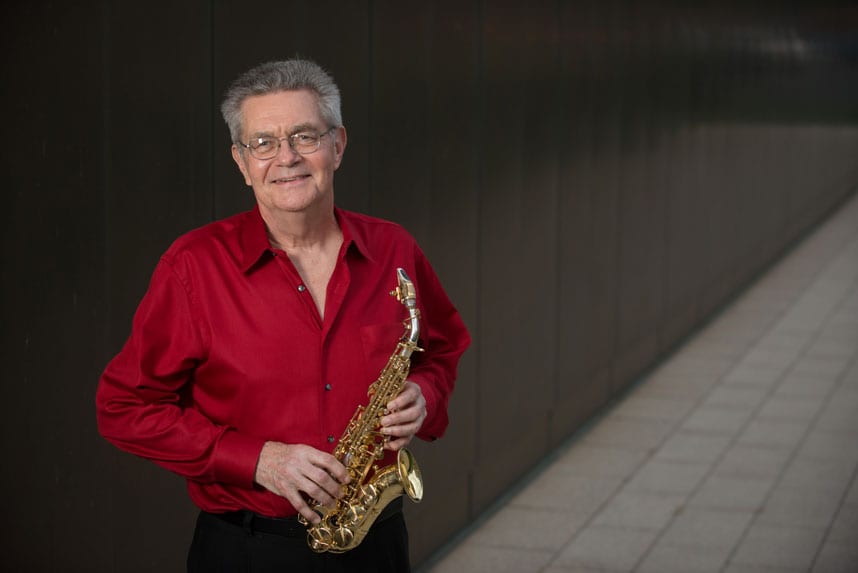
By Teddy Larson
Les Thimmig never planned on spending his career in Madison. Born in Santa Maria, California and originally from Chicago, Thimmig first visited Madison when he was four. Driving down State Street with his family, he was in awe when he saw the lit-up capitol.
But in his early career, he thought New York would be his musical home. When a call about a composition position at UW-Madison reached him in 1971, he made a decision, and never looked back. Now 50 years later, Thimmig has a storied career at the university and no intentions of leaving any time soon.
Born in 1943, Thimmig had an extremely musical childhood. Starting on the clarinet at six and the saxophone at nine, he first began writing music soon after. By the age of 13 he was a member of the Musician’s Union and playing with professional groups. The period Thimmig grew up in had plenty of opportunities to learn about music.
“It was a very healthy musical environment I came from, because the culture, just what’s in the air, would urge you to get involved with music,” Thimmig said.
Thimmig was a music composition major throughout his college career. Earning an undergraduate degree at the Eastman School of Music and then graduate degrees at Yale, he was also active as a freelance musician in New York. After his time at Yale, he accepted a composition position at the University of Victoria, a new school at the time, leading their composition and music theory department. In 1971, he was offered a position at UW-Madison to direct the composition program, and the rest is history.
In 1980 a saxophone position opened at UW-Madison, to which Thimmig was recommended. While unconventional at the time, Thimmig was thrilled to have the opportunity to not only diversify his teachings but to hopefully expand each program he was involved in.
“All of a sudden, in 1980, my job was very different,” Thimmig said. “My activities in composition were of a minor variety and there I was developing a saxophone program, with another minor area being jazz studies.”
In the jazz field, Thimmig’s role at the university has evolved over the years. When he first arrived, he was involved with the UW Jazz Ensemble for a short period of time. Then he helped teach classes for a jazz major that was first developed in 1979, even though the major was short lived. From 1982 to 1988, Thimmig helmed the UW Jazz Ensemble again. While never the sole focus, jazz has stayed an important part of Thimmig’s career.
Thimmig and a few colleagues such as Professor Richard Davis were the driving force of the limited jazz program for decades. But in 2012, the university finally created a full jazz department after hiring Johannes Wallmann to direct the program. Thimmig took a step back to let Wallmann find his vision for the department.
Thimmig currently runs the Jazz Composers Group, one of the many jazz ensembles at the university. Sometimes called a “laboratory,” it’s a place where jazz students are able to experiment more under Thimmig’s tutelage. With a foundation library of Thimmig’s work, the group slowly becomes centered on student writing each semester.
Over the years, Thimmig has also spent a lot of time doing extracurricular projects outside of the university. He has spent time as a soloist in places such as New England Conservatory Chamber Orchestra and the New York Philharmonic, as a jazz performer with the orchestras of musicians like Duke Ellington and Woody Herman, and as a teacher across the world.
“Performing, teaching, recording…I stayed busy,” Thimmig said.
For Thimmig, the story has always been a balance between woodwind performance, composition, and jazz studies.
“I thrive on variety,” Thimmig said. “Sometimes people ask, ‘how can you be giving a composition lesson and then sixty seconds later showing someone fingerings for the high notes on a saxophone?’ I said, ‘it just all blends together.’”
For Thimmig, there is no such thing as a singular directive—the combination of these fields is what has driven him and continues to drive him today.
With 50 years of teaching at the university, he has no plans of stopping yet.
“Call me up in 10 years and we’ll celebrate 60,” Thimmig said smiling. “This is what I do! I like hanging around with all these energetic young people doing things and solving these different problems, seeing all these other musicians whose work I admire, and everything else.”
Whether it be through performance, jazz, or composition, Thimmig has left his mark on UW-Madison.
